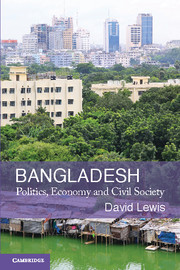Book contents
- Frontmatter
- Contents
- Maps
- Abbreviations
- Acknowledgements
- 1 Introduction
- 2 A State in the Making
- 3 Towards Bangladesh
- 4 State, Politics and Institutions
- 5 Nongovernmental Actors and Civil Society
- 6 Economic Development and Transformation
- 7 Population, Natural Resources and Environment
- 8 Conclusion
- Glossary of Bengali Terms
- Bibliography
- Index
5 - Nongovernmental Actors and Civil Society
Published online by Cambridge University Press: 05 June 2012
- Frontmatter
- Contents
- Maps
- Abbreviations
- Acknowledgements
- 1 Introduction
- 2 A State in the Making
- 3 Towards Bangladesh
- 4 State, Politics and Institutions
- 5 Nongovernmental Actors and Civil Society
- 6 Economic Development and Transformation
- 7 Population, Natural Resources and Environment
- 8 Conclusion
- Glossary of Bengali Terms
- Bibliography
- Index
Summary
State building in Bangladesh remains a work in progress, leaving a considerable amount of institutional space for a wide range of nonstate actors. These range from traditional local-level institutions to more recently established forms of national and international organisation. As we saw in Chapter 4, there is a long history of nongovernmental groups in Bengal, from professional associations to missionary groups, but Bangladesh has more recently become well-known internationally for its extensive “development NGO” sector, in which two Bangladeshi organisations in particular – Grameen Bank and BRAC – have gained international reputations. In contrast to many other developing countries, where international agencies tend to represent the most visible forms of the nongovernmental actor, Bangladesh has an unusually large number of homegrown development NGOs. Although foreign organisations have played important roles in the establishment of many of these local organisations, today the Bangladesh NGO sector displays a strongly indigenous character and can be seen as a local formation of globally determined influences. It is also quite diverse, ranging from many local, small and voluntaristic groups to large-scale organisations that are now some of the world's best-known development NGOs, managing multimillion dollar budgets and occupying high-rise offices. A few of these larger NGOs have become comparable in size and influence to some government departments, bringing fears in some quarters of the creation of a “parallel state.”
Apart from the general agreement among most observers that Bangladesh's NGO sector is relatively large, accurate and up-to-date facts and figures are surprisingly hard to come by. One source estimated that there were close to twenty-two thousand NGOs by the turn of the millennium (DFID 2000). By 2004, the Social Welfare Ministry had 54,536 NGOs registered and the NGO Affairs Bureau had 1,925. In 2005, a World Bank study cited official statistics stating that there were 206,000 “not-for-profit” organisations in the country and that the NGO sector contributes 6 to 8 percent of Bangladesh's GDP annually (Irish and Simon 2005). The wide range of figures illustrates an important difficulty facing any discussion of NGOs because the label lacks precision and is highly subjective. The defi-nition of what constitutes an NGO is far from clear – for example, although some organisations are formal, many others are not, and although any organisation receiving foreign funds must be registered, there are many NGOs that are locally resourced and therefore do not feature in official statistics.
- Type
- Chapter
- Information
- BangladeshPolitics, Economy and Civil Society, pp. 109 - 135Publisher: Cambridge University PressPrint publication year: 2011



